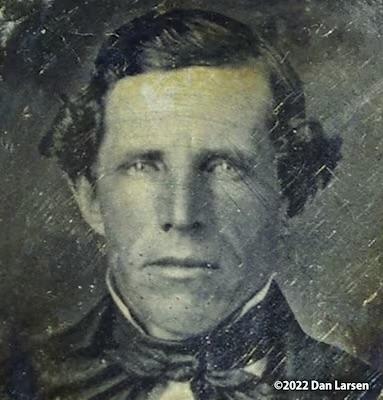Leaderboard
Popular Content
Showing content with the highest reputation on 04/02/25 in all areas
-
Yup. One of my favorite books is titled Man of Steel and Velvet. It’s a male self help book. Jesus Christ is the exemplary model. A man should be steadfast and ready to lead and defend his family and principles - the Steel part. And supportive and sensitive to his spouse and children - the velvet. People many times only imagine the velvet part of Jesus. He was firm and tough as nails as well. It’s why I love the daguerreotype of Joseph Smith so much. It displays both the steel and the velvet. I think many saints prefer the soft portraits of Joseph Smith. We have to provide our family, friends, saints, and community with real examples of men. I’m doing my part.2 points
-

Easter Thoughts Etc 2025
zil2 reacted to HaggisShuu for a topic
I am looking for some inspiration also as to how people add a spiritual twist to their Easters. I don't want it to be a day about chocolate eggs and lamb legs this year.1 point -

Easter Thoughts Etc 2025
Traveler reacted to HaggisShuu for a topic
One concept I've always struggled to grasp, is how does Christs resurrection mean we can all be resurrected? How does the victory over death work? I understand other aspects of the atonement, how his experience in Gethsemane and death on the cross enables us to be forgiven. But I really struggle to understand how his resurrection enables our resurrection. Is this a bit nit picky? Maybe. I just like to understand.1 point -

Easter Thoughts Etc 2025
JohnsonJones reacted to SilentOne for a topic
Why did Jesus, the Lord God Omnipotent who sits at the right hand of the Father, creator of worlds without number, lawgiver and judge, condescend to come to earth to be born in a manger, live out most of His mortal existence in obscurity, trudge the dusty roads of Judea proclaiming a message which was violently opposed by many, and finally, betrayed by one of His closest associates, die between two malefactors on Golgotha’s somber hill? Nephi, who gloried “in … Jesus, for he hath redeemed my soul from hell,” understood Christ’s motivation: “He doeth not anything save it be for the benefit of the world; for he loveth the world, even that he layeth down his own life that he may draw all men unto him.” It was love for all of God’s children that led Jesus, unique in His sinless perfection, to offer Himself as ransom for the sins of others. - Alexander B. Morrison, For This Cause For God so loved the world, that he gave his only begotten Son, that whosoever believeth in him should not perish, but have everlasting life. For God sent not his Son into the world to condemn the world; but that the world through him might be saved. - John 3:16-171 point -

April 2025 General Conference Discussion
JohnsonJones reacted to Ironhold for a topic
Over the past few months I've had some conversations with people as to why folks like the Tate Brothers are resonating with so many young men. The long and short of it is that modern Western society has done a rather bang-up job in inadvertently removing male role models from society. Far too many families no longer have a dad kids can rely on, male community leaders are being pressured to step back so women can "have a voice", popular male pop culture figures who in the past would have been a substitute are being discarded in favor of younger and hipper female replacement, and classic social structures like religion are frowned upon by the "elite". As if that wasn't bad enough, far too many "progressive" and "feminist" schools of thought regard men as being flawed & toxic by default. Cue a large number of teens and twenty-somethings being completely adrift in society and looking for anyone or anything that will welcome them with open arms. This is one of the problems the world is facing today, a lack of positive heroes and role models that people can aspire to. Younger people today don't have a Fred Rogers or a Bob Ross to gently dispense time-tested wisdom while helping to form boundaries of personal conduct; they've got the Tate Brothers and the Paul Brothers encouraging them to seek wealth for the sake of wealth and telling them that anything bad which happens to them must be society's fault. ...Thus, a big part of why so many younger individuals, particularly young men, have a botched sense of where they belong in the world and how the world should be reacting to them: they're either being told they're worthless, or being told that anyone who doesn't bow to them is worthless. It's one of the structures I talked about earlier that needs to be addressed in order to try and fix what's going wrong with the world today.1 point -

April 2025 General Conference Discussion
mirkwood reacted to Carborendum for a topic
I'd really like to see the Proclamation being canonized as OD3. But I doubt it will happen anytime soon.1 point -

April 2025 General Conference Discussion
JohnsonJones reacted to HaggisShuu for a topic
I keep hearing about 1 hour church. People keep saying "Seriously, they are already trialing it" the source being "trust me bro" I have also heard rumour about female ward clerks, exec secs and Sunday school presidents. Don't see much of an issue with these, as there aren't any priesthood keys involved with each calling as far as I'm aware. Maybe for ward clerk, definitely not for exec sec or Sunday school presidents though.1 point -

Sacred verses Secret?
HaggisShuu reacted to Carborendum for a topic
If it is hinted at in scriptures, you can "refer" to it in person. If you can find it described in scriptures, you can describe it in person. If you can find it explicitly stated in scriptures, you can state it in person. Examples: Joseph's coat of many colors was most likely his temple garment. When Jacob "wrestled with an angel," that was an endowment ceremony. When Mahonri Morinancumer saw the finger of the Lord, he was receiving a very special endowment. The parable of the wedding feast is a reference to the endowment. Clearly, the uninitiated would not be able to glean the specifics of the temple ceremony from these brief descriptions. But, to those who have been endowed, they are clear -- at least, when properly pointed out. They are vague enough that even the initiated may overlook the reference. But once pointed out, it is pretty clear. Follow the example of scriptures. That's the level that you can talk about it outside the temple.1 point -
15 - There's a sentence in Elder Cook's talk that @Ironhold really needs to hear1 point
-

In The Space of Not Many Years
Carborendum reacted to SilentOne for a topic
This reminds me of Alma 32. Specifically verse 25. We were all born with particular strengths and weaknesses and tendencies. What we experience can influence the expression of all of those, but probably some of those tendencies are stronger than others and take more effort and/or outside influences to effect. Unfortunately, I don't think I have any particularly new insights about how to build humility and remove pride. Studying 2 Corinthians 12 and Ether 12 might help. And the usual pray always, reflect and repent frequently, study scriptures daily, partake of the sacrament every week you can. But I think we all might have particular weaknesses that are going to be a lifelong struggle.1 point -

April 2025 General Conference Discussion
NeuroTypical reacted to SilentOne for a topic
I'm guessing any big thing that happens will be something I would never think of, but I want to try anyway. 1 - Adding Proclamation on the Family, The Living Christ, and/or Restoration Proclamation to the canon, probably as part of the Doctrine and Covenants. Possible, but there's a part of me that thinks adding to the scriptures should wait until the new hymnbook comes out so they can then switch the people in charge of hymnbook layout over to the new scripture layout. Seems more efficient personnel-wise. 2 - Calling new leadership Unsure. It's possible that any one of the apostles or presidency members could die this week and have a replacement called quickly. Or an assistant to the twelve could be called. Or maybe it's time for a reorganization of a presidency or the presiding bishopric - I really don't keep up with that. Does anybody know how long those positions usually go between reorganizations? 3 - Change to 1-hour church Possible. I find it unlikely, though. I guess I see too much good in the classes to think they'll be completely axed and find it even less likely that they'll remove sacrament meeting or change it to every other week. I've seen speculation about sacrament meeting being shortened to just the sacrament and then moving to classes, but that could give drastically different meeting lengths depending on ward size (unsure how big a problem that is) and it could be a struggle to get as much value from a shortened class. Especially in Primary, where classes are already only 20 minutes. Eliminating singing time feels like a bad idea. Doing just singing time - maybe? Or alternating week between class and singing time? Sacrament being administered in the classes so as to remove the need to change rooms is a possibility, but that would require either no primary, young women's, or relief society classes or else the priesthood would spend much of the hour going between the various classes to give everybody the chance to partake. All that to say, 1 hour church seems pretty complicated logistically. 4 - Changes to how/when people are ordained to various priesthood offices They just did that. Doesn't necessarily mean it won't happen again. 5 - Addition of an adult version of the Children & Youth program I'd have to think more on this idea. 6 - Use something other than bread and water as default sacrament But why? 7 - 50 new temples announced That could be cool. 8 - No more stake conferences But why? 9 - Quarterly general conference from now on 10 - Announcement of new K-12 (er, primary/secondary) church-sponsored schooling system 12 - Expansion of FSY program to include YSA summer camps1 point -

April 2025 General Conference Discussion
JohnsonJones reacted to SilentOne for a topic
I have gotten the impression that as we get further into the last days, both the good and the bad in the world increase.1 point -

April 2025 General Conference Discussion
HaggisShuu reacted to mirkwood for a topic
Rumor: 1 hour church. I don't buy it. @Ironhold is right. There is a lot of ugliness in the world. Lots of coldness and unhappiness. That doesn't mean there are not happy warm people, but to deny the reality of the darkness in the world is naive.1 point -
@Jamie123's interesting thread about Mr. Collins has led me to reflect once again on the character of Mr. Bennet. Austen's greatest genius may have been in creating and portraying highly realistic, fully fleshed-out characters, and Mr. Bennet is one of my favorite Austen characters. His flaws invite reflection. Mr. Bennet is such an enjoyable character, not because he's a cynical and sarcastic troll, but because he is a basically decent and caring individual who indulges his own worst self to so often become a cynical and sarcastic troll. Mr. Bennet (I don't believe any first name is ever given) is a highly intelligent, basically good-natured man with a sharp sense of humor and a cutting wit. His family situation is as follows: He married the beautiful but not-very-intelligent (or at least not very clever) Miss Gardiner. (The BBC/A&E miniseries names her "Fanny", but no given name is ever specified in the novel.) It is worth noting that Miss Gardiner's brother, aptly named Mr. Gardiner, is a highly intelligent man, one of those charming and impressive lawyers I was talking about. So the intelligence is in her bloodline somewhere, but apparently found little expression in her. Mr. and Mrs. Bennet were parents to five daughters. It is worthwhile understanding the basic personalities and characteristics of these five young women: The eldest, Jane, is blessed with striking beauty, a sharp mind and wit, and a very calm and pleasing demeanor. The second, Elizabeth, is similarly endowed with beauty and intelligence, though she is portrayed as perhaps not quite as beautiful as Jane—in speaking with Jane, Elizabeth humorously notes that she (Jane) is "about five times as pretty as every other woman in the room"—but perhaps even more clever. Moreover, she inherited her father's sense of humor and occasionally cutting wit. The third, Mary, is the odd duck out in that she is not as beautiful as her four sisters, and attempts to make up for her comparative plainness by nurturing her other feminine charms, such as piano playing. The fourth is named Catherine and is familiarly called Kitty, and had never really developed her own mind or wit. She's a bit of a follower, and tends to follow her younger sister Lydia's lead. The youngest, Lydia, has all the charm of her sisters and, like her sisters (except perhaps Mary) is quite pretty, but also headstrong and unconcerned about trifles such as reputation and decorum. In the book, Mr. Bennet must be at least in his mid to late forties, and is probably in his fifties. Mr. Bennet tolerates his wife, but only barely. He is not cruel or harsh, but he is not kind to her, and he does not protect her from societal evils that he thinks she has brought on herself. On the contrary, he allows himself to laugh at and mock his wife's weaknesses. This reprehensible habit does not go unnoticed by his daughters, and is one deep and important way that he fails them. Mr. Bennet authentically loves his daughters, and is especially fond of Elizabeth and Jane. This is important: Bennet likes his two oldest daughters exactly because they are intelligent and show some depth of character. He loves his other three daughters, but he "teases" them mercilessly, meaning he constantly makes fun of them and points out their stupidity for his own amusement. Mary, Bennet's middle daughter, is perhaps the most extreme victim of this neglect. She lacks much of the beauty, grace, and charm of her sisters, and thus needs her father's support and encouragement all the more. But she doesn't get it. Jane Austen herself didn't seem to like Mary very much; how sad is that? Of all the sisters, I think Mary is the unhappiest and most to be pitied. Yes, she exposed herself to ridicule and contempt several times. But how much less likely would that have been if Mary had been directed, corrected, and encouraged by a loving father instead of simply laughed at? The same is true with Kitty, but with different results. Kitty seems to be the younger daughter potentially most sharing in the gifts of her two oldest sisters, but with little parental direction, she takes her cues from her strong-willed younger sister, Lydia. Austen does allow that Kitty would go on to improve dramatically once she left her parent's home and lived in the households of her older sisters. But again, how much better and happier would she have been with an attentive and affectionate father? And Lydia...ah, Lydia. Everyone's favorite bad girl. Lydia is done in by her own temperament. She is not a horrible, vindictive person or calculating shrew. But she applies her intelligence to vapid pursuits and vanity, living the life of a wild child. Where is her father to offer some discipline? Why did Mr. Bennet not take it upon himself to curb her foolishness and demand better of her? Because he was too busy laughing at her and enjoying the spectacle of her buffoonish behavior. Bennet even admits that he failed in his duty to provide for his daughters. He assumed he would father a son to inherit his entailment, which instead passed to a distant cousin (the very Mr. Collins of the original thread I'm referencing). Bennet rues his lack of foresight and discipline in not making or saving any fortune for his daughters. Bennet is reduced to seeing his youngest daughter in a desperate scandal, watching as his brother-in-law (as he supposes) pays off a cad named Wickham to marry her after despoiling her. In his typical sarcastic manner, he berates his own financial laziness when he complains to Elizabeth that "I cannot help regretting that I did not [...] enable you to lay by an annual sum out of your income, to bribe worthless young men to marry your sisters." Mr. Bennet fully recognizes his own foolishness and failure of duty toward his daughters, though that realization apparently does not come until after all the destruction and humlilation has been set into motion. At some level, I have to imagine that he recognizes his failure to be a proper husband to his wife, though Austen doesn't seem to say much on that account. I love Mr. Bennet's character because I think it's true-to-life. Austen restricted her "omnipotent author" mode to her female characters, once remarking that she wasn't a man and couldn't speak for men (or something to that effect). But I see her keen insight into human behavior and motives in her male characters as well, none moreso that Mr. Bennet. He was a deeply flawed but also deeply likeable character. I feel like if I had actually known a real Mr. Bennet, I would have liked him and probaby considered him a friend. But I would not have modeled myself on him. Too much laughing at other people's stupidity and too little self-reflection to recognize his own.1 point



